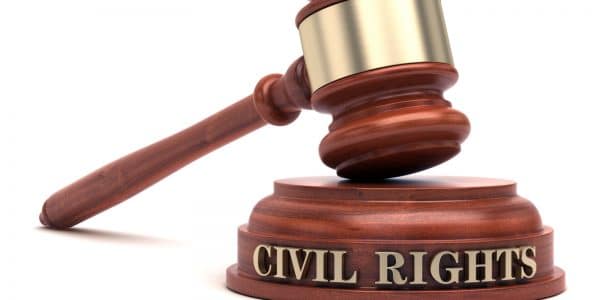As a resident of the United States, you are entitled to certain freedoms. Your constitutional rights include freedom of speech, assembly, and religion, as well as the right to petition the government and the right to procedural due process. There is also a freedom from discrimination for certain protected classes, such as race, sex and national origin.
What Qualifies As A Civil Rights Violation?
 A civil rights violation is any offense that occurs as a result or threat of force against a victim by the offender on the basis of being a member of a protected category. For example, a victim who is assaulted due to their race or sexual orientation. Violations can include injuries or even death. Civil rights can occur if a person has had their granted freedoms taken away or is discriminated against based on:
A civil rights violation is any offense that occurs as a result or threat of force against a victim by the offender on the basis of being a member of a protected category. For example, a victim who is assaulted due to their race or sexual orientation. Violations can include injuries or even death. Civil rights can occur if a person has had their granted freedoms taken away or is discriminated against based on:
- Race
- Color
- Gender
- Age
- National origin
- Disability
When a person’s rights are violated, the offender may be prosecuted under certain criminal statutes.
Common Examples Of Civil Rights Violations
Civil rights violations can take on many forms. Here are just a few examples of situations where civil rights are violated:
Discrimination Against Racial Identity In Housing
Say that an African American man submits an application to lease an apartment. The landlord then refuses to lease him the apartment as he prefers to have only Caucasian tenants in his apartment building. In this scenario, the landlord has committed a civil rights violation against the applicant by discriminating against the man based on his race. Both state and federal fair housing and anti-discrimination laws prevent landlords from rejecting applicants based on race alone.
Refusal Of Service Due To Discrimination Against Sex/Gender Identity
 Say a homosexual man walked into a restaurant, sat down and waited for the waiter. After assuming the man’s sexual orientation, the waiter refuses to provide service to the patron because of his sexual identity. In this case, the server would be guilty of violating the patron’s civil rights due to discrimination against the man’s sexual orientation.
Say a homosexual man walked into a restaurant, sat down and waited for the waiter. After assuming the man’s sexual orientation, the waiter refuses to provide service to the patron because of his sexual identity. In this case, the server would be guilty of violating the patron’s civil rights due to discrimination against the man’s sexual orientation.
Sex & Gender Discrimination
Sex discrimination involves treating someone unfavorably because of that person’s sex, which includes their gender identity (including transgender status) or sexual orientation. It is unlawful to harass a person because of that person’s sex, including sexually harassing or making offensive remarks about a person’s sex (e.g., harassing a woman by disparaging women as a group in her presence).
The law forbids sex and gender discrimination when it comes to any aspect of employment, including hiring, firing, pay, job assignments, promotions, layoff, training, fringe benefits, and any other term or condition of employment. Sex and gender are also protected classes under housing discrimination laws.
Housing Discrimination
Housing discrimination is discrimination against a protected class in the purchase or rental of housing. This includes discrimination in renting, selling, lending or mortgages and homeowners insurance.
Federal Fair Housing laws and New Mexico state law both forbid discrimination when it comes to the sale or rental of housing due to the person’s race, religion, color, national origin, ancestry, sex, sexual orientation, gender identity, spousal affiliation or physical or mental handicap.
Workplace Sexual Harassment
 Sexual harassment is a form of sex discrimination that violates both Title VII of the Civil Rights Act and New Mexico state law. Sexual harassment includes:
Sexual harassment is a form of sex discrimination that violates both Title VII of the Civil Rights Act and New Mexico state law. Sexual harassment includes:
- Unwelcome sexual advances
- Requests for sexual favors
- Offensive remarks about a person’s sex
- Verbal or physical conduct of a sexual nature that explicitly or implicitly affects an individual’s employment, unreasonably interferes with an individual’s work performance, or creates an intimidating, hostile, or offensive work environment
Sexual harassment can take place regardless of sex of either the offender or the victim, and regardless if they are the same sex or gender. Harassment is illegal when it is so frequent or severe that it creates a hostile or offensive work environment or when it results in adverse employment decisions like the victim being fired or demoted.
Harassment can come from:
- the victim’s supervisor,
- a supervisor in another area,
- a co-worker,
- non-employees, such as a client or customer
Unlawful Housing Displacement Before Court Hearing
Under NM Stat § 47-8-36 (2019), except in cases of abandonment, surrender or as otherwise permitted in the Uniform Owner-Resident Relations Act, an owner or any person acting on behalf of the owner shall not knowingly exclude the resident, remove, threaten or attempt to remove or dispossess a resident from the dwelling unit without a court order. This includes interfering with services such as electricity, gas or water.
Speak To An Experienced Civil Rights Attorney
 If you believe that you are the victim of a civil rights violation, seek the guidance of a professional personal injury attorney, like the experienced attorneys at Parnall & Adams Law. An experienced attorney can help you navigate the complex court system and ensure that you have all the right documents and meet important deadlines. Your attorney can also help you develop your case and can tell you the likelihood of success if your case should ever go to court.
If you believe that you are the victim of a civil rights violation, seek the guidance of a professional personal injury attorney, like the experienced attorneys at Parnall & Adams Law. An experienced attorney can help you navigate the complex court system and ensure that you have all the right documents and meet important deadlines. Your attorney can also help you develop your case and can tell you the likelihood of success if your case should ever go to court.
There are countless benefits that come with hiring a personal injury attorney to assist you with your case. First, an attorney will have the extensive knowledge needed to move through the court system quickly to get you the compensation that you deserve as soon as possible. Attorneys who practice civil rights often specialize in this area and have worked with countless clients, giving them extensive on-the-job experience. This is the type of knowledge that you cannot often get on your own.
A civil rights attorney can also help you negotiate a fair settlement and bring resolution to your case. For more information about your potential claim, contact the attorneys at Parnall & Adams Law.

